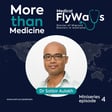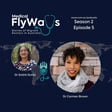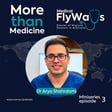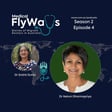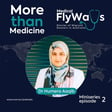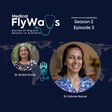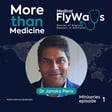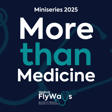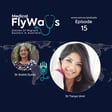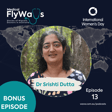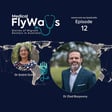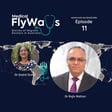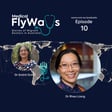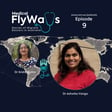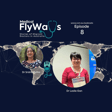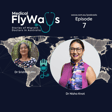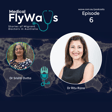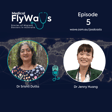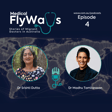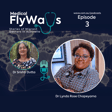Vasuki's Journey as a Migrant Doctor
00:00:01
Speaker
Medical Flyways, the untold journeys of migrant doctors in Australia.
00:00:13
Speaker
Hello, Vasuki. Thank you so much for being on the podcast. And finally, we get to have a chat. Now, we've discussed the podcast and the reasons I'm you know hosting and creating it for some time.
Early Life and Education in Sri Lanka and Abroad
00:00:24
Speaker
Would you please be able to share a little about yourself and your journey to Australia with the listeners to begin with? Thank you for having me. I mean, yeah, as you said, we've been talking about this for a long time and it's good to be finally here.
00:00:39
Speaker
able to do this. I know we've shared you all and really shared you all a few times, so it is really good to sit down and talk about things. I was born in Sri Lanka in the north, in Jaffna, and I lived there till I was 11, which was 1991, and took lived through the war, so there's a fair bit of trauma that I've seen in my lifetime, and then we moved to the city, and then went to uni in Ireland,
Medical Training Challenges and Move to Australia
00:01:06
Speaker
in Malaysia. So I went to Penang Medical College, which was governed by the National University of Ireland.
00:01:15
Speaker
And found the work very hard. The workload was very high. I was at the verge of, you know, almost, well, I was thinking about self-harming And I remember calling my mum and saying I didn't want to work there anymore and she came over, as most brown parents do, and she helped me and I finished my internship.
00:01:36
Speaker
But I knew that I couldn't work there anymore. I'd always wanted to come to Australia. So in 2004 or 2005, my friend who was working here suggested that I come and work in Tassie at the LGH, applied for a job, didn't have my MC1 or 2 or any of that.
Finding Belonging in Australia
00:01:55
Speaker
Did my IELTS, got the job and arrived in December 2005. two thousand and five And I've been in Australia since then. I did do three years in New Zealand from 2008 to 2011, but since then I've been in Australia.
00:02:12
Speaker
Thank you so much. I love how you know all of our conversations are. i was recently told by someone that they like the fact that I can be open and honest. And i had to reply and say, like, I don't know any other way. So I completely appreciate when I see it being reciprocated. So thank you very much.
00:02:30
Speaker
I have a question for you, which I haven't asked. It's just come to my mind. You described all of that with a bit of detail whether with regards to your migration journeys as a medical professional.
00:02:43
Speaker
And I recall doing some research regarding medical migration. and There was a note somewhere about saying that moving countries and moving home important.
00:02:55
Speaker
If I remember the the first or the second on the most stressful events in life, I think it comes close to getting married apparently is there is what it is in contention as well. And it you've you've mentioned your early life experiences.
00:03:09
Speaker
There's a theory that we remember things in a great level of detail in hindsight, when they are unconsciously traumatic as well. Do you think that the journey you've had as a migrant doctor across more than one continent and country was a nurturing one or uphill swimming against the current kind of experience?
Migration vs. Displacement
00:03:34
Speaker
Most of my moves were not for fun or enjoyment. It was more to survive to get the letters and then find freedom to practice the way I can practice.
00:03:48
Speaker
So till I got my fellowship, yes, it was a bit of an uphill battle. Post-fellowship and post-perman residency, post-practice ownership, ah life is a lot different.
00:04:01
Speaker
So I've lived in, of course, I was born in Sri Lanka. I lived in Ireland, Malaysia, Singapore, Australia, and New Zealand, and then back to Australia. I've lived in New South Wales. Most of the moves have been because i was I had to do it to survive.
00:04:18
Speaker
So had some good times, but without the need to move for survival, I don't know if I would have made those choices. So if you consider the displacement aspects of, because that's what you're saying, a migration is, in the word migration implies choice.
00:04:38
Speaker
and And the opposite end of the spectrum is displacement. And we have this sometimes artificial divide between migrants and refugees, even though there can be clear overlaps in the migration. in the experience and, you know, the relative differences regarding safety and physical and otherwise.
00:04:54
Speaker
I feel comfortable asking you this because I know that you're accepting of all those terms to a certain extent, labels. But when you've had a journey like this, and I'm clear I haven't, just to be, you know, just to put that there, where where do you belong? Where do you and how do you find a sense of belonging?
Home and Family Connections
00:05:13
Speaker
I miss home. I miss Sri Lanka and i will always miss home. I belong at this point where my family is, where my husband is, and where my children are. And as long as they go with me wherever I go, that's where I belong in my home and with close friends. and my close friends are not located physically anywhere near me, but that's where I belong with these people.
00:05:39
Speaker
I don't know if I belong in Tasmania, but I have made it my home and I certainly enjoy living here at the moment. And I've Don't see myself moving for the next 10 to 15 years. So my heart belongs, you know, I kind of would like to be, if I could be back home in Sri Lanka, up north, in our family home, living there, I would do that.
00:06:01
Speaker
But that's not possible at the moment. And have you ever been back to Sri Lanka since leaving? Of course, yeah, yeah. I used to go earlier, but then I realised that, you know, every year was
Visits to Sri Lanka and Cultural Roots
00:06:12
Speaker
a long travel and whatnot, and then the war was...
00:06:16
Speaker
on and off as well. It was not very safe. The war's been settled for quite a few years now, but the last time I went home was pre my last baby. So he's born now, so it's about five years since I went back, but I'm hoping to get out there this July. So I am excited about that.
00:06:37
Speaker
Yeah, no, I think as you described that, I've been asked the question when I've said I'm going home to India, I've been asked the question of, well, isn't this home? And it's quite interesting because, yeah, I feel at home when I go to India. And I think there's an element of knowing that your roots are there and that there's certain part of you that still exists in that place, even if it's in your mind. Absolutely, yeah.
00:07:03
Speaker
I miss the language, the people... You know, and I never thought as a child that I would leave home. I always thought I'd live there. I'll live in that house till I die, you know, but life has other plans.
00:07:18
Speaker
Now, in this journey that you've described and friends that are not all here in Tasmania, to be precise, ah we always have, all of us, once we've left home, have certain things that sustain us, shall I say.
Advice for New Migrant Doctors
00:07:30
Speaker
So if you're thinking of someone, a young doctor in, I don't know, Sri Lanka, India, Pakistan, somewhere on the South Asian continent, that for reasons that are specific to them, I've chosen to take the journey that you and I have to leave their country of birth, as I call it.
00:07:44
Speaker
What would you say to them? What are they looking for that was helpful to you in terms of sustaining yourself in that journey? i think one of the things I've done is kind of isolate myself away from my culture and my people.
00:07:59
Speaker
I think it's important to have that connection. And I think it was a mistake to a certain an extent on my part. So I think, you know, staying close to people with similar values and cultural backgrounds is important. and I think social media plays such a big part these days.
00:08:18
Speaker
So even finding groups online that would, you know, sustain your need for your ah cultural input is amazing. Like I've been watching some TikTok videos of some freelance channels, you know, and just listening to language and looking at recipes and things has been just amazing.
00:08:38
Speaker
So use the technology and, you know, keep in touch with family and friends, keep in touch with the movies. haven't watched a Tamil movie a long time and, you know, they take two and a half hours to, you know, to finish off. So it it does take a bit of time commitment, but I'd love to watch another movie sometime soon.
00:08:59
Speaker
So even just staying on top of those things, you know, you'll feel a lot more connected, I think.
Preference for Rural Lifestyle
00:09:03
Speaker
And ah the choice to as to where you would work in Australia, was that ever, you know, I know that you've said it today and I'm certainly aware that your family and where they are is important to you and including some of your extended family.
00:09:16
Speaker
But where you chose to live, was that driven by any other reasons? like, you know, is is because I'm aware that some of my colleagues have chosen to live in new South Wales or Victoria where the multicultural diaspora is wider, more diverse.
00:09:33
Speaker
How does that, how does it affect your choice? Or does it? Look, if given a in, you know, from a cultural input perspective, I'd be in Sydney somewhere near the temples where there's music and dancing.
00:09:49
Speaker
i used to dance as a child and you know, I would probably be enjoying that. But I also like the rural lifestyle. And I like a bit of bushwalking. I like going to the mountains and the beach.
00:10:01
Speaker
So I don't think I can have everything I want. um I've had to make this choice to be here. But I think a way to fulfill that need is to fly out and to go to Melbourne and get some dosas or, you know, try some at least and go to Sydney and meet with friends.
00:10:19
Speaker
So I think There are ways working around it, but yeah, I still, the living rurally would still trump everything else for me because I just like the quieter lifestyle.
00:10:31
Speaker
And have you always worked rural? Yes, I have. I've worked in the city, like in Launceston. mean, it's not a big city like Sydney or Melbourne, but it's it's a city. I have worked there, but not full-time and not long-term.
00:10:45
Speaker
I've always been MMM4 and above most times, yeah.
Support Networks for Migrant Doctors
00:10:50
Speaker
And are there many migrant doctors that you have been in touch with in the cohort of people that you either worked with or is that a, and shall I say, connected group of people in spite of probably being fairly diverse?
00:11:05
Speaker
Yeah, yeah, definitely. Because we you know we are all migrants and there are certain things that you know we all have in common, you know for example, dealing with the R-Prize and IMG, dealing with the college, you know, being on a program, sitting for exams while having English as your second language, you know, so there's a lot of common things that we have and, yeah, I've met lots of foreign trained doctors and, yeah, that's been a good thing. We've all supported each other, so yeah.
00:11:36
Speaker
And does that support extend to, and I'm kind of thinking along the lines of physical proximity would have helped you find some of these people, but are there any other formal networks or connections? or ah Because I must admit, I'm only aware of one in Queensland, which is a network of doctors, I think it's RDAQ, that...
00:11:58
Speaker
facilitate that. I'm not aware of any other networks that exist outside of Queensland. Are there any other formal networks that facilitate interaction between other people or is it, you know, like a a whole host of Facebook groups?
00:12:11
Speaker
Yeah, look, the the Facebook groups are amazing and there's a lot of sharing of information and support. The Health Recruitment Plus, which is a not-for-profit government organisation that helps foreign trained doctors to come into Australia,
00:12:27
Speaker
helps with recruitment. They do put on twice a year ACPD weekend and I think that's really nice to go to and meet a lot of people. They also in invite family to come along as well. So that really gives us, you know, that family feel. And so you're not just meeting the doctor but you're also meeting their families.
00:12:45
Speaker
And then, you know my husband gets to meet other partners and, you know, children. are My children now get to meet the other kids as well. And that that was really good. And yeah, I don't know. i think it's always HR Plus or Toronto Good Show. Yeah. And is that one of the rural workforce agencies? Yes. So that's the Tasmanian one. So yeah, I think that there is a similar, like a conference or a, I know what to call it specifically in in Queensland as well.
00:13:11
Speaker
Now we've discussed some of this is in terms of your work outside of your clinical roles. Like you have had some endeavors into advocacy and
Challenges for Women of Color in Medicine
00:13:22
Speaker
I'm just intrigued because when I got into some of these spaces, I was, you know, part of my project was showing that the number of GPs, particularly women of color that are in leadership positions, as an example,
00:13:36
Speaker
is not necessarily representative of the membership, numerically, quantitatively. We can always discuss that a you know when you get numbers, do you actually get equity or voices? Well, that's a separate question altogether.
00:13:49
Speaker
But do you think there are barriers to this? and Or is it simply, because this is a bit of a chicken and egg, because often it's a question of Well, do we self-select and not put our hand up?
00:14:02
Speaker
There's little, if any, evidence that I've seen in regards to this. I can see the results, but little evidence to tell us where the barriers or enablers are in that regard. Have you had any experiences that would give you any insights in this in this matter?
00:14:18
Speaker
i chose to step away, well, not completely step away from kennelism, but to have a bit of voice because i was a bit sick of the way things were at that time.
00:14:32
Speaker
I don't think we as women of colour are offered certain things which, certain positions or even, you thought of to fill that position with women of colour as opposed to say, you know, a man, ah white man in the Australian context.
00:14:54
Speaker
It has certainly affected you know my progression within clinical medicine as well as <unk>s outside of clinical medicine, but i play but I'm sure i'm not the only one. I don't know what we can do to change it. I think education is key and just say and showing our willingness to be part of things outside of clinical medicine or even within clinical medicine.
00:15:17
Speaker
I'd like to see it change, but I'm still learning. I'm learning from other women of colour who are in advocacy positions, certainly follow them on Twitter or social media, Facebook or whatever it might be.
00:15:31
Speaker
That's, yeah, there's plenty more to learn. and And in that sense, is there anyone who has particularly inspired you in your journey? That doesn't have to be the leadership journey. I'm thinking more broadly of, you know, the how far you've come. Is there anyone in particular, professional or personal, that you would think was an inspiration and why?
00:15:51
Speaker
Not really. I think I've taken little bits from different people and not one person in particular. I've certainly spent a lot of time talking to yourself, asking questions and learning a lot.
00:16:04
Speaker
And I certainly follow Iman Joshi, who's been quite vocal over the last few years. And of course, you know, people like Karen Price have also been very good to follow and learn from.
00:16:20
Speaker
Yep. No, I absolutely agree, Karen. When I came to Australia, like I had moved from the UK and my connections were, like you're saying, you're kind of limited by social media was there, but I don't think it was there to the extent that it is now.
00:16:35
Speaker
And particularly being able to ask questions and, you know, figure out what it is like to be a GP in Australia was a lot simpler Because I was able to approach people like Karen and she was prepared to respond so and answer.
00:16:51
Speaker
Yeah, that was quite refreshing from my perspective because I can't imagine as a trainee in the UK, I would have had direct access to anyone, you know, kind of in that domain of leadership.
00:17:02
Speaker
So it was quite, yeah, it was helpful. I mean, I have to say that I do speak to or message Todd Cameron quite frequently about clinical and non-clinical stuff. And he's been very helpful in getting me to think about what I want and what I want to do with my life and what
Mentorship and Inspiration
00:17:23
Speaker
And I must mention him as someone who's helped me a lot over the last couple of years, especially as I've delved into practice ownership. Yeah, we have a nickname for Todd and he's probably going to not be pleased that, but it's on social media so everyone can see it. So there's a host of us that call him the Yoda but with good reason.
00:17:43
Speaker
And so, you know, when he's a very wise man and someone that is extremely generous with a lot, including his time, as you've said, and really has championed women business owners in general practice over the last few years, I think, just recognizing that he was able to provide that support, which, you know, sometimes we we don't know what we don't know.
00:18:06
Speaker
So how else do we do we get there? so yeah, like, yeah, he has been my mentor in many ways as well. But it's fascinating because I think he would also tell me that I don't need to necessarily say that on air. So yes, ah very humble man indeed.
00:18:23
Speaker
I've never actually met him and I look forward to meeting him one day because it's kind of this, you know, this weird thing where you kind of send off these questions to this person on the other side and then you get these thought-provoking, know, links or, you know, whatever it might be and you know that whatever comes from there is always good quality and makes you think really hard and, yeah, and you there's a lot of self-discovery what he says, it's been great.
00:18:51
Speaker
He said, when you meet him, I'm sure that there will be more aspects of him that you will discover. but I may have hounded him a few times, so not going to say anymore. ah Now, you did an article not long ago, which is in Circulation, which talks about the challenges for IMGs in the landscape and how that
Challenges for International Medical Graduates
00:19:12
Speaker
So we've had two different reports, parliamentary reports regarding this. and that you know and And I know that you and I i thought of this in a in terms of a humorous thing, but then I thought, well, actually have governance roles as well. So I need to be careful about how I frame it.
00:19:28
Speaker
But in India, in politics, they say, if there's a problem you can't fix or don't want to fix, you have a committee for it. So for a few years, the problem goes away.
00:19:41
Speaker
is there anything in particular that you think, and I'm asking purely from the experiential aspect of what is it that you see that can be fixed or that IMGs ourselves can facilitate or be involved with that is achievable in terms of improving that journey or addressing the challenges? Yeah.
00:20:02
Speaker
I think the basic thing that you can offer an IMG is respect for who they are as a person and for the skills they have. Because I see a lot of questions about, oh you know, we're getting an IMG, how much should we pay them?
00:20:16
Speaker
Do we pay them the same thing as a GPT-1? You know, respect their knowledge, respect them for who they are, and then you will know the answer if it should be the same as a GPT-1 or not.
00:20:28
Speaker
And respect them as someone who's coming to work for you as an employer, you know, teach them things, show them how it's, you know, how this health system works, help them with their exams. And I think, you know, the biggest thing is the exams. There's such a high failure rate. And I think, you know, there are organisations that provide training and they are amazing at what they do. However, a lot of people might not be able to afford it.
00:20:55
Speaker
So I don't know what we can do to help with that, but that would be good. And You know, GP Academy, you know, like it's amazing. I did it twice because I had my exams over two years and it got me through the exams and I paid twice and I'm glad I did.
00:21:12
Speaker
But that might not be possible for other people. So I think, you know even if we had some sort of funding available would be nice. And the other big thing that happens is that the employers abuse people the IMGs with regard to their contracts and how they're paid and what they're paid.
00:21:30
Speaker
You know, if at least the government sponsors them, then at least the visa is held by government sponsorship and not by a person, especially the employer. So that would be something that I'd love to see happen. But I don't know as IMGs or as doctors how we would make you know make that change happen.
00:21:49
Speaker
But those are two big things. I think the financial assistance as well as the visa is very, very important. Like personally, I know that, you know, when my employers at some point held my visa, i felt really scared to even say, oh, I can't do this shift this Saturday or you know, sorry, I'm sick, I can't come in next week because I'm so scared that they're going to fail me for my opera or they're going to say, oh, sorry, we're not going to, you know, we've got your visa, we're not going respond to sponsor you next year.
00:22:18
Speaker
There is a lot of power in that relationship. Oh, very much so, yes. And i think those are the two things I'd, you know, hopefully like to see it fixed at some point. Yeah. So it's ah that I guess what you're referring to is equity. and And like I find this an interesting conversation because equality and equity are two words that often there's the forever debate on it.
00:22:43
Speaker
But yes, so the the internationally trained doctors are coming with, you know, already a background and training and skill set, willingness, resilience, you know, I can keep going.
00:22:56
Speaker
And I have a funny analogy, but and and I'm not sure how accurate it is. But if you if you plant a rose bush in the back garden and with all of your native plants and forget that the rose needs some extra nurturing, you really shouldn't be surprised with the outcome of it.
00:23:12
Speaker
So I think that's very interesting because I think as someone that came over, when I came, i was lucky enough to come as a spouse. So I didn't have to experience that visa-related.
00:23:26
Speaker
challenge, which, you know, well, my other half did. He still is an internationally qualified doctor, not a GP. so yeah, it is definitely part of that experience. And knowing, i remember we deferred some significant life decisions until we got permanent residence because we were not prepared to take those risks or able to take those risks.
00:23:47
Speaker
Now, this is a question that I've been thinking about whether to ask you or not, but I think I will because I'm sure you'll have something to add that I can learn.
Hopes for Children's Future in Australia
00:23:57
Speaker
So you have two kids and the and conventional term would be described as biracial children.
00:24:06
Speaker
If I said to you you what would you wish Australia to look like by the time they become adults? What are the things that you think would come to mind? I would like them to be treated the same as everyone else.
00:24:19
Speaker
And that is a big statement and it is, you know, in every way. And I don't think it's going to happen. However, I'd like it to be better than it is now.
00:24:32
Speaker
I put them in a private school and I didn't look at the academic outcome for that school. I didn't look to see if they had, you know, they were good at certain sports or music or whatever. I just walked in to see...
00:24:46
Speaker
the diversity amongst the students, and they had all the flags of the countries where the children were from in the gym. And that's all I needed to say, yeah, our children are going to go there, at school.
00:25:00
Speaker
Tasmania is a small place. There's still a lot of work to be done for everyone to be treated the same. So that's what I would hope for them. I suspect that as they get older, they'd want to fly away to the mainland, as we say,
00:25:16
Speaker
But that's what I wish for them, that they would not have to face or have to push back against certain behaviours from people that's discriminatory based on skin colour and gender.
00:25:30
Speaker
Can you give me an example? I mean, have you, when clearly you have experienced it. Is there something that is, and I'm not asking you it because I like, I'm sure that we can look at, like, I think I i can relate to that is why I'm asking that in terms of, sometimes it's fairly, you know, and and unintentional and innocuous, but like, I'll i ah explain what I mean is I,
00:25:50
Speaker
I was reading a book, like a favorite of mine called The Four Stages of Psychological Safety. And it's an organizational psychologist who's written it. And he says the first step of inclusion is greetings.
00:26:02
Speaker
So I found that, like, i I know that is the case and we've lived it, all of us have, irrespective of who we are. But so let's say the school, like, I'm fascinated. Did it live up to the expectation that it had set itself up for in terms of inclusion?
00:26:19
Speaker
She's only been at school for a year and a half. So she's got a diverse group of friends. you know, and they very openly, you know, talk about where their mummy's from, daddy's from. There's one little girl who says, you know, my mummy's Filipino, I'm half Filipino. And it's quite, you know, really nice conversation. And Mira, my five-year-old, has made another friend who is Sri Lankan as well at school during vacation care, and they've been hanging out and playing together.
00:26:52
Speaker
And I was so excited. My daughter's made a brown friend. So, you know, she likes eating her curry and, you know, like we don't have access to Sri Lankan curry where we live. and So, you know, those are things that, you know, you hope they will have access to.
00:27:08
Speaker
But i think the school has lived up to its expectation with with the diversity, definitely. yeah I'm going to ask you one other question and then I think we will wrap up. If there's anyone who is considering practice ownership, you know, we have many people that come here and want to get into general practice.
Owning a Medical Practice
00:27:26
Speaker
Was there anything in particular that prompted you to consider practice ownership? Yeah, so I wanted to be an owner of a practice either in a group or solo for for many years. I think i the first time i asked someone about it, you know, if the time if and when the time comes, will they be willing to sell part of their practice? was like 10 years ago.
00:27:47
Speaker
i just wanted to be able to shape the practice. I wanted to be able to, you know, kind of lead the way to, know, a different style of running the practice and how we provided our services.
00:28:01
Speaker
But with time, I realised that I had a different way of looking at how I wanted to run the ship. and that it was hard to find other doctors with similar interests. So I finally ended up opening a practice by myself and I'm having a really good time.
00:28:19
Speaker
You could almost say I'm thriving. And, you know, we're looking at inviting more GPs to join our practice. So I think, you know, if somebody ever wants to do it, go do some research, talk to lots of people who've done it before, and then,
00:28:35
Speaker
if that's what you still want to do, go for it because you only have one life. And that's what I said to myself. It's, you know, we were given this opportunity. Someone asked if we wanted to come out here and start a practice and we wanted it for so long and we were like, sure, we'll give it a go.
00:28:50
Speaker
And it's been, we started on the 1st of August. so It's been quite a few months now. We've got 900 enrolled patients, going pretty well so yeah no regrets as yet then absolutely not know awesome well i'm I'm absolutely certain that we're going to continue having conversations of recording this podcast and I wish you all the very best with this endeavor and whatever else you choose to contribute and send your energy towards and I mean hopefully we we too get to meet face to face at some point I look forward to that too.
00:29:25
Speaker
So thank you very much for sharing what you have today and hopefully see you. We never know. Maybe you're coming to Brisbane or I'm heading your way. Thank you very much, Vazaki.
Call for Stories from Other Migrant Doctors
00:29:36
Speaker
At Medical Flyways, we're always on the lookout for inspiring stories from migrant doctors in Australia.
00:29:43
Speaker
If you have a colleague whose stories need to be told, head to wave.com.au slash podcast. Medical Flyways is recorded on terrible land in Ningen, Brisbane.
00:29:57
Speaker
This podcast focuses on overseas doctors and their families finding a home in Australia. We acknowledge and thank the traditional custodians of country throughout Australia and recognise the continuing connection to lands, waters and community.
00:30:15
Speaker
We pay our respects to Aboriginal and Torres Strait Islander cultures and to Elders past, present and emerging.

